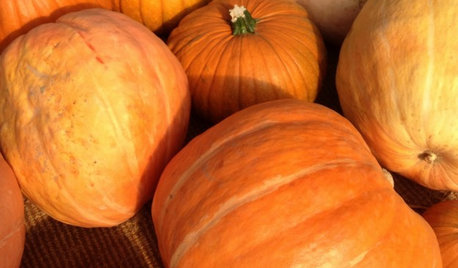Soup left out overnight
coolbeansw
10 years ago
Featured Answer
Comments (45)
grainlady_ks
10 years agolast modified: 9 years agostir_fryi SE Mich
10 years agolast modified: 9 years agoRelated Discussions
Transplants left out overnight
Comments (4)65 at night? Really? If I have to wait that long my growing season will be 1/2 over! They can go in the ground here in about 8-10 days and I know it won't stay that warm by then. Anybody in zone 5 know what temp I can let these guys have a sleep over outside?...See MoreBring Out Your Soups and Stews!
Comments (50)This recipe originally appeared in the New York Times. Seems too simple to be this delicious but it is a wonderful marriage of flavors. Red Wine Pinto Beans with Smoky Bacon Ingredients: 1/2# smoky bacon, diced 1 large onion, peeled and diced 2 celery stalks, diced 2 medium carrots, peeled and diced 4 garlic cloves, minced 1 large sprigs rosemary 1# dried pinto beans, soaked overnight 1 T. coarse kosher salt 2 c. dry red wine Optional toppings: olive oil, coarsely grated Parmesan, black pepper or red pepper flakes In the bottom of a large pot over medium-high heat, brown bacon until golden, about 5 minutes. (I like to remove the crisp bacon and add it back at the end). Stir in onion, celery, carrots, garlic and rosemary. Cook, stirring occasionally, until vegies are tender, 5-7 minutes. Drain beans and add to pot along with 1 T. salt. Pour in enough water to just cover the beans (about 7-8 cups). Bring liquid to a boil; reduce heat and simmer gently until beans are just tender, 45 mins - 1 hour. Meanwhile, in a small pot over medium heat, simmer wine until it is reduced to 2/3 cup, 20-30 mins. Remove rosemary branches from bean pot and discard them. Pour wine into beans and bring to a simmer. Cook for 10-20 mins. longer to meld flavors and thicken broth to taste. Drizzle with olive oil and sprinkle with Parmesan, if desired; add more salt and black or red pepper to taste....See MoreLeft out overnight and forgot!
Comments (6)Sounds like a good plan. FWIW, I hardened off a set of super hots in 4 days last month, then a week later set out 8 super sweets and never brought them back in. All are thriving. Temps 70 - 95 and up....See MoreDeck Cleaner left on the surface overnight
Comments (0)I know this is the dumbest thing anyone can do. I bought wolmans deckbrite deck cleaning solution and sprayed it on my deck. In the middle of my deck cleaning, I had unexpected guests and I had to take a break. But by the time I could go back to deck washing, it was dark and I couldn't see anything. Now I have to wait until tomorrow to clean/power wash the deck to clean the deck cleaner off of my deck. Leaving behind the reasons for this mishap , What is the best way to clean up the mess that I have created here. How to remedy the potential damage or negative effects? I was planning on using Cabot's semi transparent stain after letting the deck dry out completely. what are the repercussions here? Thanks in advance for your input. P:S: This is new wood (one year old) and has never been stained. I am a first time home owner and have no experience in deck staining....See Morecloudy_christine
10 years agolast modified: 9 years agoJohn Liu
10 years agolast modified: 9 years agosleevendog (5a NY 6aNYC NL CA)
10 years agolast modified: 9 years agograywings123
10 years agolast modified: 9 years agofoodonastump
10 years agolast modified: 9 years agoGracie
10 years agolast modified: 9 years agoritaweeda
10 years agolast modified: 9 years agocarol_in_california
10 years agolast modified: 9 years agocoolbeansw
10 years agolast modified: 9 years agosleevendog (5a NY 6aNYC NL CA)
10 years agolast modified: 9 years agosleevendog (5a NY 6aNYC NL CA)
10 years agolast modified: 9 years agodcarch7 d c f l a s h 7 @ y a h o o . c o m
10 years agolast modified: 9 years agoannie1992
10 years agolast modified: 9 years agoIslay_Corbel
10 years agolast modified: 9 years agolaceyvail 6A, WV
10 years agolast modified: 9 years agograinlady_ks
10 years agolast modified: 9 years agosally2_gw
10 years agolast modified: 9 years agodcarch7 d c f l a s h 7 @ y a h o o . c o m
10 years agolast modified: 9 years agomalna
10 years agolast modified: 9 years agocloudy_christine
10 years agolast modified: 9 years agochase_gw
10 years agolast modified: 9 years agodcarch7 d c f l a s h 7 @ y a h o o . c o m
10 years agolast modified: 9 years agomalna
10 years agolast modified: 9 years agodcarch7 d c f l a s h 7 @ y a h o o . c o m
10 years agolast modified: 9 years agochas045
10 years agolast modified: 9 years agocloudy_christine
10 years agolast modified: 9 years agograinlady_ks
10 years agolast modified: 9 years agodebrak2008
10 years agolast modified: 9 years agodcarch7 d c f l a s h 7 @ y a h o o . c o m
10 years agolast modified: 9 years agofoodonastump
10 years agolast modified: 9 years agocoolbeansw
10 years agolast modified: 9 years agoannie1992
10 years agolast modified: 9 years agoJohn Liu
10 years agolast modified: 9 years agowestsider40
10 years agolast modified: 9 years agoannie1992
10 years agolast modified: 9 years agograinlady_ks
10 years agolast modified: 9 years agoCathy_in_PA
10 years agolast modified: 9 years agosally2_gw
10 years agolast modified: 9 years agosleevendog (5a NY 6aNYC NL CA)
10 years agolast modified: 9 years agomainecoonkitty
10 years agolast modified: 9 years agoGracie
10 years agolast modified: 9 years agobeachlily z9a
10 years agolast modified: 9 years ago
Related Stories

SMALL SPACESDownsizing Help: Where to Put Your Overnight Guests
Lack of space needn’t mean lack of visitors, thanks to sleep sofas, trundle beds and imaginative sleeping options
Full Story
MOST POPULAROvernight Guests Coming? How to Be a Great Host
Ensure a good time for all — including yourself — by following these steps for preparing for and hosting houseguests
Full Story
KITCHEN STORAGEMove Over, Soup Cans — the Kitchen Appliances Are Here
Design a pantry with room for mixers, coffeemakers and more, for less countertop clutter and handy access
Full Story
LIFEHave the Kids Left Home? 16 Things to Consider
‘An empty nest is not an empty heart’ and other wisdom for when the household changes
Full Story
HOUSEKEEPINGHow to Clean Your Fridge, Inside and Out
Keep your refrigerator clean and fresh, while you gain storage space and lose those ‘UFOs’
Full Story
LIFEWe Can Work It Out: Living (and Cleaning) Together
Run a household without fussing and fighting with these ideas for how to work together on household chores
Full Story
DECORATING GUIDESHow to Decorate When You're Starting Out or Starting Over
No need to feel overwhelmed. Our step-by-step decorating guide can help you put together a home look you'll love
Full Story
HOUZZ TOURSHouzz Tour: Bringing Out the Midcentury in San Francisco
Renters give their 1950s apartment loads of personal style with color, pattern and a rediscovered wood floor
Full Story
EDIBLE GARDENSSummer Crops: How to Grow Pumpkins
Start in spring to grow your own fall decorations and have plenty left for pies
Full Story
KIDS’ SPACESMy Houzz: A Shared Boys’ Bedroom That’s Right on Track
This room has fun and functional souped-up style for two car-obsessed brothers in San Francisco
Full Story





John Liu